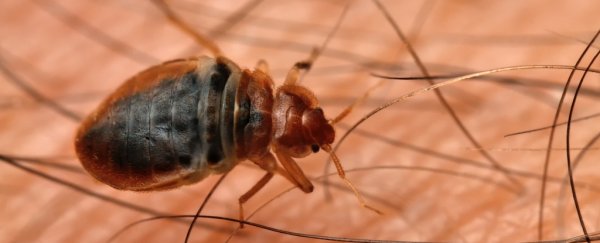Among the possible pest infestations you could get, bed bugs are definitely one of the worst. They'll nest inside your mattress and feast on your flesh at night, and they develop resistance to pesticides really quickly.
So once you have them, getting them gone is really tricky and requires professional help.
And there has been a resurgence around the world in the last decade, possibly exacerbated by the accessibility of low-cost travel options.
Bed bugs, or Cimex lectularius, are small, can't fly, and prefer living in holes in their host's sleeping area, yet infestations are common around the world in travel accommodations.
The likeliest explanation is that they're hitchhiking rides in travellers' luggage.
There are steps you can take to minimise the risk of that happening to you, according to researchers from the University of Sheffield in the UK.
Namely, taking care of your dirty laundry - because it turns out that C. lectularius likes your clothes when they're grubby.
To get to that point, first the team thought about mosquitoes, another insect that feeds on the blood of mammals.
Mosquitoes are attracted to carbon dioxide, which is present in mammalian exhalation. However, in the presence of the smell of a human body, the mosquito will preference that over CO2.
It's possible that bed bugs have similar instincts, so the team set up two identical, temperature controlled rooms to figure out if that was the case.
Containers of 10 bed bugs, 5 male and 5 female, were placed in the rooms. One room had elevated CO2 to simulate the presence of a human in the vicinity, the other did not. Into each room, the researchers placed four tote bags of laundry, two dirty and two clean.
Interestingly, while the CO2 seemed to initiate more host-seeking behaviour, it didn't seem to make much difference to where the bed bugs went after they had emerged from their container. Similar, as the researchers thought, to mosquitoes.
What did make a difference was the dirtiness of the clothes - "bags containing soiled clothes were significantly more attractive to bed bugs than identical bags containing clean clothes," the researchers wrote in the study.
They conducted this experiment a total of six times, alternating which room had the elevated CO2, and changing the positions of the bags. In each run, the bed bugs gravitated towards the dirty clothes - and, moreover, they stayed there, as a count 96 hours later ascertained.
So if you're travelling, it's possible you can gain a measure of protection from bed bugs by sealing up, or even washing, your dirty laundry.
"Soiled clothing left in an open suitcase, or left on the floor, of an infested room is likely to attract bed bugs," the researchers wrote. "When packed into the suitcase, they will accompany their host back home."
And if you do end up with bed bugs, be careful about throwing things away. There's a handy list of Dos and Don'ts here.
The paper has been published in the open access journal Scientific Reports.
